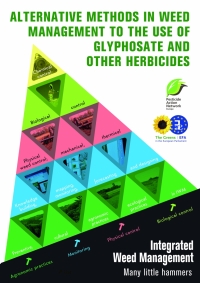Press releases
Working with nature and “many little hammers”: PAN Europe today has published an updated edition of its report on alternative to glyphosate as a contribution to the ongoing discussions among some Member States, led by France, on phasing out glyphosate and promoting alternatives.
This year’s Bee Week in the European Parliament has been the occasion for the agroindustry to make sure the real solutions needed to support the beekeeping sector have not been discussed.
The European Food Safety Authority (EFSA) has today published a number of reports looking at whether the granting of ‘emergency’ use derogations for neonicotinoids by some EU Member States to their farmers in 2017 was justified. The reports have been published in the run up to Bee Week, an event co-organised by EFSA aimed at designing a better future for bees and pollinators.
In today’s meeting from the EU agricultural ministers, Slovenia will be triggering a discussion on how to step up the protection of EU bees and other pollinators.
The European Commission has published today its legislative proposals and its impact assessment on CAP reform. Within the hundreds of pages of documents, pesticide use reduction is not mentioned once!
Today, the European Parliament has adopted an own initiative report "The Future of Food and Farming" (Rapporteur DORFMANN, EPP) as a contribution to the forthcoming reform of the European Common Agricultural Policy, meant to be released Friday.
PAN Europe welcomes the EP’s emphasis on pesticide use reduction, which was conspicuously absent in version of the CAP legislative proposals seen so far.
Today, the General Court from the European Court of Justice of Luxembourg confirmed that the European Commission acted lawfully by banning the use of bee-killing neonicotinoids on bee-attractive crops in 2013. The verdict from the Court is an answer to the challenge that Bayer and Syngenta initiated in 2013 after the partial ban on their products. PAN Europe, together with other NGOs has intervened in the court case in support of the action of the European Commission.
On May 2, experts from around the world will gather in Rome for a global symposium on soil pollution. The event, organised jointly by several UN agencies, offers an important opportunity to highlight the urgent need to invest in soil health, according to the leaders of Pesticide Action Network (PAN) International.
Today, Member States have backed the proposal from the European Commission to ban all outdoor uses of 3 bee-killing neonicotinoids. By the end of the year, imidacloprid, clothianidin and thiamethoxam insecticides will finally disappear from our environment for the sake of our bees. PAN Europe warmly welcomes the European Commission’s steadiness in resisting to several Member States and the agroindustry that favour unsustainable practices in conventional farming.
In 2013 the Pesticide Action Network lodged a complaint with the EU Ombudsman on the derogation used by Commission service DG SANTE called „confirmatory information” This derogation makes it possible to approve pesticides even when the EU Food Authority EFSA has not concluded they are safe to use and when important data gaps still exist. These derogations have allowed for bans and discontinuation of use of numerous pesticides to be avoided, and has gradually become a standard procedure used by DG SANTE.

